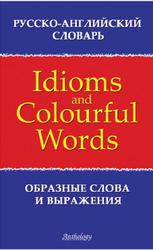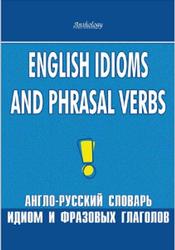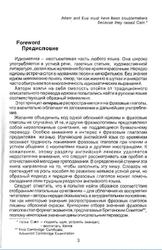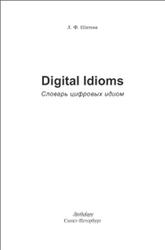Словарь именных идиом, Шитова Л.Ф., 2013.
Последняя из тематического цикла книга идиом, содержащая на сей раз имена собственные, заимствованные из Библии, мифологии, истории, литературы и реальной жизни. Богатый справочный материал, сопровождающий устойчивые выражения, призван удовлетворить читательский интерес и помочь активному использованию идиом в речи.
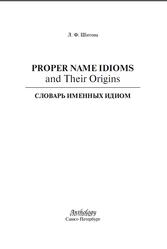
A.
Adam style – (архит.) «стиль Адама», английская неоклассика
Adamesque and Style of the Brothers Adam is an 18th century neoclassical style of interior design and architecture, as practiced by the three Adam brothers from Scotland. The Adam brothers were the first to advocate an integrated style for architecture and interiors. Commonly and mistakenly known as “Adams Style,” the proper term for this style of architecture and furniture is the “Style of the Brothers Adam.” The Adam style found its niche from the late 1760s in upper-class and middle-class residences in 18th-century England, Scotland, Russia (where it was introduced by Scottish architect Charles Cameron), and post-Revolutionary War United States.
Another Richmond in the field – «Ещё один Ричмонд на поле боя» (о неожиданно появившемся, нежданном человеке; иногда о конкуренте)
The phrase alludes to Henry of Richmond (later Henry VII of England), chronicled in Shakespeare’s “Richard III” (Act V, Sc. 4): I think there be six Richmonds in the field; five have I slain today. Whatever the origin, today it simply refers to an unforeseen participant or attendant.
Купить .
Теги: словарь по английскому языку :: английский язык :: Шитова
Смотрите также учебники, книги и учебные материалы:
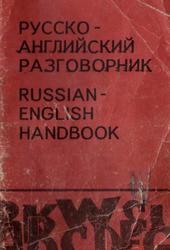 Русско-английский разговорник, Пикман А., 1991 — Предлагаемый „Русско-английский разговорник первое пособие для тех, кто желает овладеть английским языком, выпущенное СТ „РИМарк . Являясь оригинальным изданием, разговорник … Англо-Русские, Русско-Английские словари
Русско-английский разговорник, Пикман А., 1991 — Предлагаемый „Русско-английский разговорник первое пособие для тех, кто желает овладеть английским языком, выпущенное СТ „РИМарк . Являясь оригинальным изданием, разговорник … Англо-Русские, Русско-Английские словари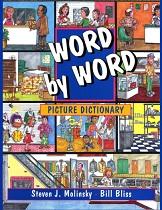 Word by word picture dictionary, Molinsky S.J., Bliss B., 1994 — FAMILY MEMBERS II. A. Who is she? B. She s my aunt. A. What s her name? B. Her name … Англо-Русские, Русско-Английские словари
Word by word picture dictionary, Molinsky S.J., Bliss B., 1994 — FAMILY MEMBERS II. A. Who is she? B. She s my aunt. A. What s her name? B. Her name … Англо-Русские, Русско-Английские словари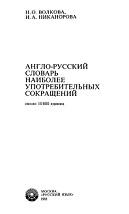 Англо-русский словарь наиболее употребительных сокращений, Волкова Н.О., Никанорова И.А., 1993 — Словарь включает около 10 тыс. наиболее употребительных сокращений современного английского языка, встречающихся в периодических изданиях и художественной литературе. Предназначается для … Англо-Русские, Русско-Английские словари
Англо-русский словарь наиболее употребительных сокращений, Волкова Н.О., Никанорова И.А., 1993 — Словарь включает около 10 тыс. наиболее употребительных сокращений современного английского языка, встречающихся в периодических изданиях и художественной литературе. Предназначается для … Англо-Русские, Русско-Английские словари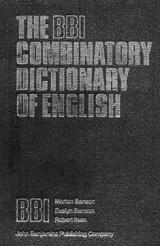 Комбинаторный словарь английского языка, Бенсон М., Бенсон Э., Илсон Р., 1990 — Данный словарь переиздание в СССР словаря, впервые выпущенного в 1986 г. издательством „Джон Бенджамине Паблишинг Компани (Амстердам-Филадельфия). Это первый большой … Англо-Русские, Русско-Английские словари
Комбинаторный словарь английского языка, Бенсон М., Бенсон Э., Илсон Р., 1990 — Данный словарь переиздание в СССР словаря, впервые выпущенного в 1986 г. издательством „Джон Бенджамине Паблишинг Компани (Амстердам-Филадельфия). Это первый большой … Англо-Русские, Русско-Английские словари
 Русско-английский тематический словарь, 9000 слов, Кириллическая транслитерация, 2013 — Данная книга содержит более 9000 наиболее употребительных слов, организованных по тематическому принципу. 257 тем словаря охватывают основные сферы повседневной деятельности … Англо-Русские, Русско-Английские словари
Русско-английский тематический словарь, 9000 слов, Кириллическая транслитерация, 2013 — Данная книга содержит более 9000 наиболее употребительных слов, организованных по тематическому принципу. 257 тем словаря охватывают основные сферы повседневной деятельности … Англо-Русские, Русско-Английские словари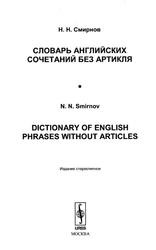 Словарь английских сочетаний без артикля, Смирнов Н.Н., 2013 — Настоящая книга представляет собой словарь-справочник сочетаний без артикля в английском языке, который предлагается впервые в мировой литературе. Словарь состоит из … Англо-Русские, Русско-Английские словари
Словарь английских сочетаний без артикля, Смирнов Н.Н., 2013 — Настоящая книга представляет собой словарь-справочник сочетаний без артикля в английском языке, который предлагается впервые в мировой литературе. Словарь состоит из … Англо-Русские, Русско-Английские словари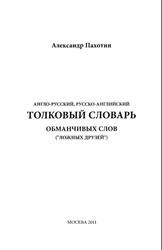 Англо-русский, русско-английский толковый словарь обманчивых слов, Пахотин А., 2011 — В английском языке есть много обманчивых слов, которые лишь кажутся легкими. Именно эти слова и составляют основу данного словаря. Мнимая … Англо-Русские, Русско-Английские словари
Англо-русский, русско-английский толковый словарь обманчивых слов, Пахотин А., 2011 — В английском языке есть много обманчивых слов, которые лишь кажутся легкими. Именно эти слова и составляют основу данного словаря. Мнимая … Англо-Русские, Русско-Английские словари 300 самых употребительных английских глаголов, 300 verbs, Белина Л.И., 2011 — Книга адресована всем, кто хочет освежить или расширить свои знания. Все мы учили английский язык в школе, но не можем … Англо-Русские, Русско-Английские словари
300 самых употребительных английских глаголов, 300 verbs, Белина Л.И., 2011 — Книга адресована всем, кто хочет освежить или расширить свои знания. Все мы учили английский язык в школе, но не можем … Англо-Русские, Русско-Английские словари

